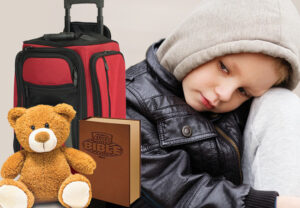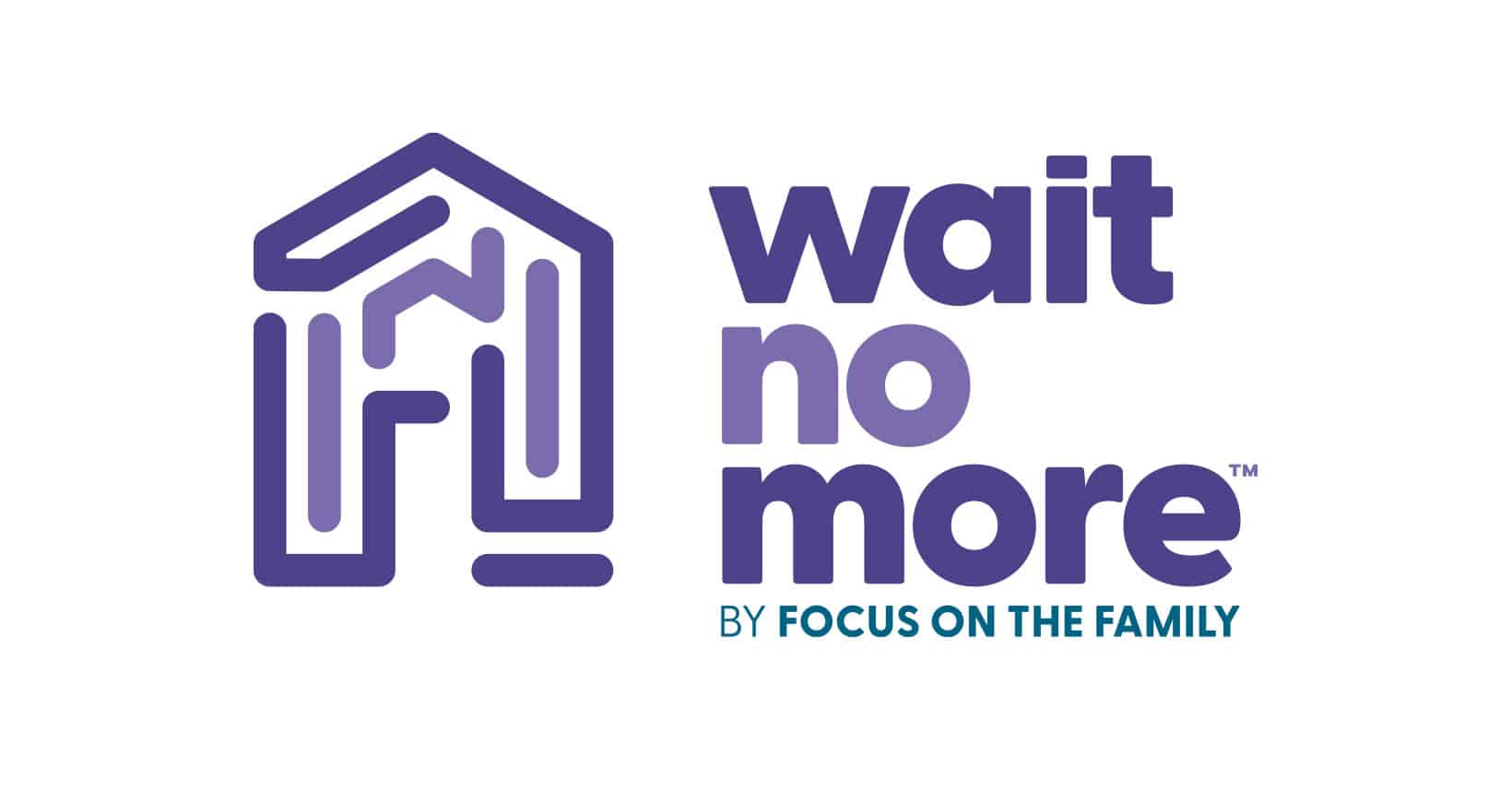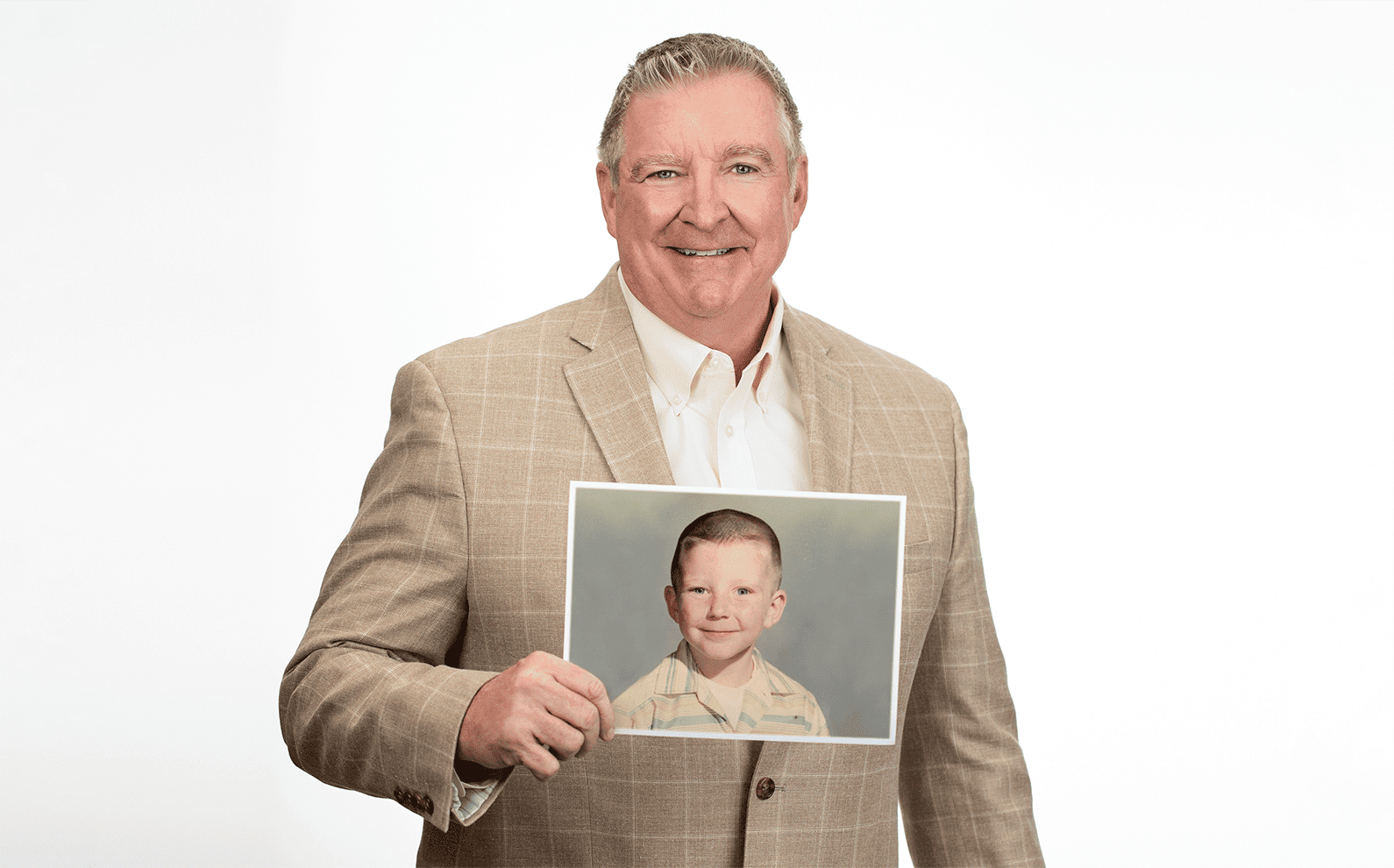Kayla North: One of the biggest myths in our society and also prevalent in the church is that like, “I can go it alone.” You know, “I’m gonna be dependent on God, but I don’t wanna be interdependent on my neighbors, on my family, on my community at large.” And I think that foster care and adoption really invites you to, um, leave that myth behind. It can be really challenging because we wanna, we all wanna be the ones that are the givers and not the ones that are in need of help, right?
John Fuller: And that comment comes from a woman who knows all too well how much help she needed as a foster and adoptive mom. Today on Focus on the Family with Jim Daly, we’re gonna be exploring foster care and adoption. I’m John Fuller, and we’re so glad you joined us today.
Jim Daly: You know, John, uh, whenever we bring up this topic, people start to back up because you know what, it pressures you to think about what you’re doing, and I want to challenge folks. Uh, Jean, my wife, challenged me. I remember when I was here talking about doing foster care and getting people engaged with the foster area. You don’t have to do foster care, but you can wrap around a family. It’s called respite care. Mm-hmm. And do something to help that family. I remember I got home and Jean said to me, “You know, if you’re gonna ask people to do it, we should probably do it.” (laughing) And I said, and I said, no, I said, “I, I already did. I was the foster kid. I paid my dues.” And she said, “Yeah, that’s not gonna cut it.” Isn’t that awesome?
So I, we got licensed, we had lots of foster kids come through our home, and we’re still connected to some of them and engaged as kind of grandparents now. And it’s been great. But let me just challenge you to think about what the Lord has said. You know, you want pure religion according to the Book of James, then take care of the widow and the orphan, and that the foster system is full of orphans, and we need to step up as the Christian community. I always say this, but wouldn’t it be nice if the Christian Church wiped out that waiting adoption list?
John: Hmm. Yeah. And it’s doable. Um, we have a program, uh, by the way, Jim, called, uh, Wait No More, uh, full of resources, uh, for you as an adoptive or foster family, or if you just want to wrap around, as Jim said, these foster families. And, um, we have Ryan and Kayla North with us today to kind of unpack this topic. Uh, they’re speakers, parenting coaches, podcast hosts. Together they founded One Big Happy Home where they train and equip caregivers about trauma and behavioral challenges and attachment issues. Uh, Ryan’s written a book called Wherever You Go: A 28-Day Devotional for Adoptive and Foster Parents. And the Norths were involved in foster care for about 10 years, and, uh, cared for about 30 children during that time. Uh, today they have six children, four of whom came through the foster care system.
Jim: Welcome to both of you.
Kayla: Thank you.
Ryan North: Thank you so much.
Kayla: Glad to be here.
Jim: Great to have you. Now it’s, so, it is kind of funny that we think like that the way I describe Jean’s challenge to me.
Kayla: Mm-hmm.
Jim: But it is, you know, somebody else will take care of that. Why do we need to think about it, right?
Kayla: Yeah, for sure.
Jim: Isn’t that what we often do?
Ryan: Well, that’s often what we do. And then, and even on a micro level in families, it’s often mom driven.
Jim: Yes!
Ryan: I, I remember the first time we, we taught a parenting class live, and, and I asked everybody, “Why were you here?” And every single mom did some version of, “I wanna reach my child’s heart. I wanna help them.” She cried. And 9 out of the 10 dads went. And I said, “Well, why are you here, sir?” And said, “She said, I had to come.” [Laughter]
Jim: You know, and that, gosh, when you look at it, that shows a basic difference between genders. It’s so funny that I hadn’t thought about that, but that nurturing aspect of a woman, it comes far more naturally to you than it does to us men.
Kayla: Oh, yeah.
Jim: But it’s like where the scripture says it, “Hey, you need to pay attention to these things.” And the Lord Himself said, “You know, if you really want to touch my heart, help a child who doesn’t have a parent.” Right?
Kayla: Yeah.
Jim: So let, let’s hit that question right outta the gate, Ryan. I mean, for the men are going, “Yeah, maybe let’s put that in the prayer box for the next six months to a year.” (laughing) I mean, it, it is just honest, and I’m just kind of there too. I don’t, you know, I got a busy schedule. I could list all the reasons why we didn’t have time to do this…
Kayla: Right.
Ryan: Yeah.
Jim: . . . but tell me why men should lean into this and should be that stabilizing figure.
Ryan: Okay. So two responses to that. Number one, I think we, we talk a lot about leadership in the home, and I think that, that we, there’s a lot of stepping up that needs to be done. We, we, I work with a lot of dads and really encourage them. You have to step into that leadership role that the Lord called you to. And part of that is going, yes, I hear that. That’s a good idea. We’re gonna do it instead of kicking it down the road like you suggested. And the other reason I think that societies that are the most prosperous are ones that are based on Christian ideals.
Jim: Yeah.
Ryan: This idea that we voluntarily self-sacrifice for the benefit of others. When you look throughout the world, those societies tend to flourish more than others. And so it’s not just helping the child, but I think on a macro scale, it helps society be, be a better place as well.
Jim: Let me ask both of you, you, you seem to have this passion even in your courtship when you, you know, were just thinking about getting married and it’s not the normal thing a couple would talk about, you know, “Honey, I can’t wait to go to Hawaii with you.” Yeah. That’s kind of the normal thing you’re talking about. But why was it such a passion for you to talk about foster, foster care, foster engagement?
Kayla: Yeah. Well, and I initially foster care scared me to be honest.
Jim: Good.
Kayla: I, I, (laughing), yeah, that’s true. It is good. Um, it, it’s scared me a lot because I, I would say, “Well, I, I’ll love them too much. I, it’ll be too hard if they leave, you know, I can’t do that.” But I thought adoption would be a good, safe avenue is kind of what I thought. Adoption will be safe. It’ll be a, um, the place we can kind of bring in some kids, we can help them. We kind of had a little bit of a rescue mentality. We have a home, right? We didn’t have any children. When we started our foster care journey, we didn’t have any children. Um, we’d been married a couple of years, about two and a half years.
Ryan: About two and a half, yep.
Kayla: We started kind of investigating adoption, right? I said, “I wanna adopt.” We had talked about it before we got married. Um, we both had a little bit of adoption kind of in our story, a foster care in our story. My grandparents were foster parents. My mom’s aunt and uncle were foster parents. We saw that kind of, you know, I saw that growing up. He saw, you know, from his family. Yeah. He’s got a, you know…
Ryan: My, my dad was raised by his aunt and uncle when he was three. Um, he was handed over by his parents. And I didn’t know this until we told him that we were gonna adopt, but he remembers his dad saying, “You can have him. We don’t want him.”
Jim: He remembers hearing that.
Ryan: He, he told me that the day we told him that, that we had decided to adopt. And, and, and just that, those three seconds put my dad into perspective for me because he carried that his whole life, “I’m really proud of you and Kayla for wanting to do this, because you’re gonna help a kid like I needed help.”
Kayla: Mm-hmm.
Ryan: And, and so if you, I don’t have time to unpack my relationship with my father here, but, but it’s, it’s not, it’s not like that a lot. Yeah. He’s, he’s a very, very, you know, based on his story and his generation. . .
Jim: Kind of stoic.
Ryan: . . .he’s stoic kind of, doesn’t really talk about his feelings much. I once suggested that your child had impacted how you viewed the world as an adult. And he literally went, “Ugh,” (laughing) and walked out of the room. So for-
Jim: So he, he was in touch with his feeling.
Ryan: So for that, so for that, so that moment sticks out to me because it was so out of the norm with him.
Jim: You know, people listening and viewing us on YouTube, they’re, they’re hearing this and going, “Well, it’s almost like you guys were crafted for this, your dad’s experience, your heart, Kayla.” But that’s not required. I mean, what it requires is a heart for children.
Kayla: Yeah.
Jim: I mean, that’s the prerequisite and wanting to love these kids into a healthier place.
Kayla: Yeah. Well, and stepping aside of your, out of your comfort zone, right? When-
Jim: That’s the hardest part.
Kayla: That’s hard. It’s-
Jim: Especially in the US.
Kayla: Yeah. I mean-
Ryan: Well, because the whole, the whole thing, the whole world’s set up for your, your comfort. Um, the way I think about foster care parenting is that it is the, um, it is a real tangible way to love your neighbor the way you love yourself because you’re taking care of your neighbor’s child for the period of time that they’re unable to take care of their child.
Jim: Yeah.
Ryan: And if you view it like that, then reunification doesn’t become scary. Your feelings don’t become important. And like the story, right. It, it costs the Good Samaritan something, it inconvenienced him. He went out of his way and he paid for the person’s recovery. And so you have to realize that it, part of loving your neighbor is gonna inconvenience you, and you just have to decide that you’re okay with it.
Kayla: Yeah.
Jim: It isn’t necessarily gonna be easy (laughing). That’s, and you, in fact, you talked about the idea, and I think for us as Christians, particularly Christian parents, you know, we like to go by the rules. We like standards. Here’s the bar and we expect you to hit it every day.
Kayla: Yeah.
Jim: You could pretty much throw that out the window when you’re in foster care ’cause these kids are coming in, they’re broken emotionally, they’ve had trauma. And we can’t expect those kids to come in and behave either like our children or like a perfect picture kind of thing. So, Ryan, you talk about that in the book, describe what you need to do if you are a parent that is black and white, that maybe struggles with a bit of grace (laughing), sees things, maybe a little legalistically.
Ryan: Yeah.
Jim: But what you gotta do?
Ryan: You know, um, we talk about a, a lot of times, and you mentioned it in the James 1:27. And for the longest time there were a lot of ministries that had a name plus 1:27 at the end.
Jim: Uh-huh.
Ryan: And, and my favorite, and I think the most important part of that verse is what is an orphans in their distress. I think the word “in” is, is a pivotal word in that.
Jim: Two letters.
Ryan: Yeah. Because some, because for a lot of, a long time, and it’s different now than it used to be ’cause you know, when we started 20 years ago or whatever, right. But, but there was certainly this idea that if we could just change the child’s address, whether that be a different address in your town or a different address in a different country, then everything’s gonna be just fine because we have taken them out of their problems. Well, the problem with that mentality is it creates this expectation of a high level of gratitude, which becomes very frustrating when you’re not the recipient of said gratitude.
Jim: Yeah.
Ryan: But I think it pivots on the word in. And so there’s a story in the book. I’ll do the brief version of it. A friend of ours is in a car accident. And, um, because Hollywood, California exists, you think that every time you’re in a car accident, the car’s gonna explode. And so he’s panicking ’cause he can smell the fuel, but he’s trapped. And so the paramedics arrive and one of the firefighters climbs in through, through the window on the other side and sits in the car with him, gets his attention and tells him, “Look, you’re gonna be fine. And I know you don’t trust me, but you’re gonna be fine and I’m gonna stay with you till we’re both out of the car. So if, if, if we die, if you die today, I’m dying with you.”
Jim: Wow.
Ryan: “But I will not leave your side until we’re both out, out of this car.”
Jim: What heroic that is.
Ryan: Yeah. And my, and my friend said to me that he said, this calm just washed right over him as this man said to him. And that had the jaws of life to get him out of the car and stuff, and got him out of the car. And, and he was just fine. And remember him telling that story, he actually preached one Sunday, and he told that story during his sermon. And I remember thinking, “That’s the key to foster care.” You, you have to see the car, you have to recognize that there’s a car accident and you have to be okay climbing into the car because climbing into the car is the first step getting us out of the car, that takes time.
Jim: Yeah.
Ryan: And so, yeah. We have to climb into the distress.
Jim: But in what you’re saying there is to climb into the chaos.
Ryan: Yes, sir.
Kayla: Yeah.
Jim: And it’s chaos. You know, you don’t know what the next second is gonna bring. And that is sometimes a fair description of the foster activity.
John: Mm-hmm.
Kayla: Yeah.
Jim: Right?
Kayla: For sure.
John: This is Focus on the Family with Jim Daly. And today we have Ryan and Kayla North. And, uh, they’re sharing from their heart and their experiences, uh, inviting you into some of that mess and chaos that, uh, God can be present in and often redeems in powerful ways. We wanna invite you to, uh, learn more, uh, at our website. We’ve got a whole section of our site dedicated to the Wait No More program that we mentioned earlier. Uh, stop by FocusontheFamily.com/broadcast to learn more.
Jim: Kayla, I, I so appreciate your mom’s heart. And Jean had the same mama’s heart to want to help these kids. But I also recognize one of the things she struggled with, you’ve struggled with, and that is you come up short.
Kayla: Yeah.
Jim: ‘Cause this well these kids have, that emotional well-
Kayla: Oh yeah.
Jim: … nobody can fill. It’s like just incremental, reaffirming that we’re here for you, we’re gonna be here for you, we love you, we care about you. And it, it’s like you put three gallons in and the kids take two gallons out, but for a mom, you feel guilty.
Kayla: Yeah.
Jim: Like, you’re not making up ground that you need to make up. How did you process that in terms of your sense of failure?
Kayla: Yeah.
Jim: And I think you had a story in the book, Ryan, where you walked up and you were crying-
Kayla: Oh yeah. For sure.
Jim: … outside the door of a bedroom.
Kayla: Well, I always, I kind of describe it as like, you, you’re pouring into a colander, not into a cup. You know, people say you gotta fill the cup and it’s a colander. It’s constantly, you’re constantly having to refill.
Jim: Leaking.
Kayla: Well, yeah. It’s leaking out. But yeah, I mean, there was a moment. So we, we brought home our son, and he was almost four, and he had memories, and he had, you know, he, he could tell you the things that he’d been through. And he, he knew the people that he was missing and he wasn’t seeing. And, and, and he had some behaviors that were bizarre that were, you know, “What, what’s going on? This isn’t making sense to me.” I had nannied all through college. I hadn’t babysat as a kid, you know, did all the thing. I was really good with kids.
Jim: Yeah.
Kayla: And so here I had this expectation that I’m gonna be great as a mom. Like, I’m gonna know exactly what to do. I’m gonna know exactly how to handle this. And so when I was, came up against behaviors, I didn’t know what to do with and-
Jim: Mm-hmm.
Kayla: … and things that were, that were like, “This doesn’t make sense, and I don’t know what to do.” It really tugged on something inside me that was like, “Uh-oh, maybe you’re not good enough.”
Jim: Mm-hmm.
Kayla: You know?
Jim: Well, that, that’s exactly it.
Kayla: And that was, yeah. And that was where I had to kind of go back, kind of unpack, like, “Where did that come from?”
Jim: Mm-hmm.
Kayla: Like, what was it, where was a point earlier in my life where I, I didn’t feel like I was good enough and why is this tugging on that?
Jim: Mm-hmm.
Kayla: Why is this making me feel like, “Oh my gosh, you’re not a good mom. You, you won’t be a good mom.” I mean, I had a four-year-old and an 18-month-old, you know, it was like, “I should be able to parent these kids.” And that was kind of what I thought. And so, you know, and he had no expectation. He’s like, “I don’t know what to do with kids.” You know (laughing).
Jim: Good place to start. I like that approach.
Ryan: I think it was a good place to start because …
Jim: Low expectations.
Ryan: Yeah. Well then, I didn’t feel like I was a failure.
Jim: Yeah.
Kayla: Yeah.
Ryan: But that’s what men do (laughing).
Kayla: Well and I felt like that-
Ryan: It’s a coping mechanism.
Kayla: … I was failing him too ’cause I was like, “He’s looking to me like, you know what to do with kids and here you don’t know what to do. Oh, no.”
Ryan: Well, I, I think though we talk about that as a failure moment, but I think it’s, it’s a huge moment because we didn’t ask for help before that moment.
Jim: Right.
Ryan: The, the, the low point of that story is actually the high point of the story, because we didn’t know we needed help-
Jim: Mm-hmm.
Ryan: … until she was crying outside the room that night.
Jim: Right. And I think that’s – illustrates exactly what the experience is like.
Kayla: Yeah.
Jim: We were very similar.
Ryan: Yeah.
Jim: We thought we, I mean, look, we got experts every day talking to me.
Kayla: Yeah (laughs).
Jim: So I thought, we’re perfectly capable of this. And then you get into it and you’re going, “Uh-oh, I’m out of my depth.”
Kayla: Mm-hmm.
Jim: And I think you just need to go in knowing that.
Ryan: Yep.
John: Yeah. And Jim, as you know, we didn’t do foster care, but in the adoption experience that we’ve had, the trauma was significant.
Kayla: For sure.
John: And you just going back to that sense of failure, the importance of community and people helping out is so critical because it’s not a one-time I feel like a failure, it’s an ongoing time because these children are, they have to express and process that trauma. And many times they don’t want to, just throw it away and, “I’m gonna do my thing.” So practically you need a, a group of people around you. What can they do to help, uh, somebody who’s in the space of helping a foster child or raising an adopted child from trauma?
Kayla: Hmm. I mean, there’s so many things that you can do that, you know, people think, “Well, I have to foster or have to adopt in order to help these kids.” But the reality is, if you can just support the family, because it’s hard. I mean, it’s, you know, the first day you bring home a new placement, you’re trying to get to know this kid. You gotta, you gotta know what they like, what they don’t like. You’ve gotta figure out what makes them explode, what calms them down. You’re doing all these things. And so, you know, when we had people show up with food, you know, it was like, “Let me just drop off some snack food because now you, you know, you had three kids and now you have five. So let me just drop off some things for you.”
Ryan: Yeah. We went, had a friend who went to Costco, and she just rang the doorbell and went and climbed in her car and there was a couple of boxes of-
Kayla: (laughs).
Ryan: … of easy-prep Costco thing.
Kayla: Easy… Yeah.
Ryan: I, I’ll tell you though, the one that’s kind of solidified it, that this for me is we had a pretty difficult placement. And I got home from work one day and I walked in and there was this woman standing at our kitchen table folding our laundry. And I walked around it, and Kayla was sitting at the other end. Her hair was wet, she’d just gotten out the shower and, and was drinking a cup of coffee while her friend folded the laundry. And I’ll, the reason I’ll never forget it is because she was folding some of my underwear when I walked in (laughing).
Jim: Yeah. That’s a little uncomfortable.
Ryan: And I looked at her and, and my inner monologue went, “You can either be embarrassed and feel uncomfortable that some, one of your wife’s friends is folding your underwear, or you can thank the Lord that you have somebody who’ll come over to your house and fold your underwear for you.”
Jim: Yeah. Boy, that’s true.
Ryan: When we chose the second one. And that’s, I mean, it, it, it doesn’t have to be the big things, come over and say, “I’ll do a load of laundry while you just sit and do nothing.”
John: Yeah. Little acts, acts of grace and-
Ryan: Yeah. A little acts of grace and kindness.
Jim: Yeah. A key thing there, I mean, this has been studied and there is an optimum number of friends who could help. If you have five families wrap around a foster family or a foster adoptive family-
Kayla: Mm-hmm.
Jim: … that eases the pain. And that’s doing some shopping, doing some laundry for them, maybe house cleaning just to get a little relief. But that is the magic number. And again, isn’t that interesting that five families, if you can wrap around.
Kayla: Yeah.
Jim: Think of that. I’ve always said there’s 360,000 churches in the US and almost 350,000 foster kids. That’s just one child per church.
Kayla: Right.
Jim: And are there five families that can wrap around that one-
Kayla: That one family.
Jim: … family and do this? And, uh, you know, that’s one of the keys there. You know, I also want to talk to, at least my experience there, he was talking about trauma. I remember one of the boys we had, very young child at the time, probably three or four, stuttered terribly when he first got to the home. And, uh, he had food insecurities, and it manifested as food hoarding.
Kayla: Mm-hmm.
Jim: So we’d come down and for like a month, this was the routine, I’d come down and he’d say, “Mr. Jim, can I have a bowl of cereal?” “Oh, yeah.” “Mr. Jim, can I have some toast?” “Of course.” “Mr. Jim, can I have pancakes?” “Oh, yeah. Let’s make those.” I whip them up. And I just, I wanted to say yes.
Kayla: Mm-hmm.
Ryan: Yep.
Jim: And it lasted about three weeks.
Kayla: Mm.
Jim: And we did this routine, not every day, but many days. And then one day he just woke up and said, “Can I have a bowl of cereal?” And I said, “Sure.” And I was waiting,
Kayla: That was it.
Jim: … getting, getting (laughing) the batter, getting the batter going and that was it.
Kayla: Yeah.
Jim: And of course he never ate all the other stuff.
Kayla: Right.
Jim: But I never mentioned it. He didn’t mention it. Yeah. It was just like, and his stutter went away at the same time.
Kayla: Yeah.
Jim: So you never know what is going on in a little child’s heart about not having enough food.
Kayla: Oh, yeah. We had a little girl that, um, she was almost four when she was placed with, no, she was almost five, when she was placed with us. And, um, we had a babysitter, so when we both were working at the time, and so the babysitter lived five houses down from us, and would cook breakfast for the kids, would do, you know, lunch for them. It was all part of what we paid her, right? Was breakfast. And so we would get our other kids up who were going to school, and we would feed them breakfast, and then we would wake her up just in time to go down to the babysitter.
Well, one morning she woke up and a couple of the kids were still eating breakfast, and she flipped out. I mean, just threw herself on the ground, “Why don’t I have anything?” And, and, and the first day I tried to reason with her ’cause I was like, “You’re going to miss Bethany’s house.” Right. “Miss Bethany’s gonna feed you breakfast, this morning I look at the menu, I’m like, it’s pancakes and bacon.” And, and, and it’s nothing is helping. And I reached into the pantry, and I got her like a little breakfast bar and I said, “Here sweetheart, here’s a breakfast bar and a banana.” And she was like, “Okay.” And she never ate it, but she needed to have it with her. She needed to have that security of having that food and knowing, because she didn’t trust me when I said, “You’re gonna get breakfast.”
Jim: Well, and maybe that’s the right place to end, which is one of the benefits of what we do in the foster area is building the hope and the trust-
Kayla: Mm-hmm.
Jim: … in that child’s heart.
Kayla: Yeah.
Jim: Expand on that.
Kayla: Yeah, for sure.
Jim: I mean, that’s been one of your goals, right?
Ryan: Yes. So I was thinking about your story about the, um, the multiple breakfast items.
Jim: Yeah.
Ryan: And most parents we’ve worked with over the last decade plus would not have given the three breakfasts.
Jim: Yeah.
Ryan: Because, because that’s a battle that they’re willing to fight. But, but if you can just go, “Okay.” Not every hill’s one to die on.
Jim: Correct.
Ryan: Okay. Let’s, so let’s, let’s have the that be the governing premise here.
Jim: Yes.
Ryan: And rather help the see this as your opportunity to help the child rather than, rather than getting the child to conform to the rules of your home necessarily. Because sometimes I think the mindset is, well, these children come from chaos, ’cause we use that word a lot. What they need is insane amounts of structure.
Jim: Yeah.
Ryan: And, and so we tend to dial the nurture down because they need the boundaries. And that’s a mistake as you’ve already learned, because when you, ’cause when you kept the nurture high, a lot of positive things happened for that young man. And so-
Jim: Right. The insecurities go down.
Ryan: The insecurities go away because he learns that you can be trusted.
Jim: Right.
Kayla: Mm-hmm.
Jim: That’s exactly right.
Ryan: And then that’s the deficit you have to make up. His worldview when he comes into your house is adults hurt kids; adults can’t be trusted. Then you need to change that.
Kayla: And I think one of the biggest mistakes that foster parents, and adoptive parents make is we think there’s this timeline of like, “If I can just do this for three weeks, six months, one year, that this child will just, everything will be fine. And they’ll just be a typically developing child.” But the reality is that it cycles, you know?
Jim: Oh, yeah.
Kayla: It’s, there’s different developmental times where things get a little harder. And so we’ve had kids who were doing well for a while, and then something in their life kind of brought up an insecurity, you know.
Jim: Mm-hmm.
Kayla: Brought up something that they weren’t sure about. And we had to go back and do some more hard work with them because we thought we’d built this level of trust. But then we got to a place where it was like, “Okay, can I really, really trust you even when I’m at my worst, even when I’m in a hard place.”
Jim: Yeah. And I think that, to me, after our experience, that’s one of the best, uh, billboards for engaging in foster care.
Kayla: Mm-hmm.
Jim: Kids because of what they’ve been through, what they’re going to express to you, maybe verbally, often, not verbally, but through their actions is, “If I do this, will you still love me?”
Kayla: Yep.
Jim: “If I do this, will you still love me?”
Kayla: Yeah.
Jim: And we process that as kind of normal adults, like you’re testing me.
Kayla: Yeah.
Jim: And they are, but they’re doing it from a place of pain.
Kayla: Yeah. It’s not intentional.
Jim: Like I’m the problem when I did those things, my mommy and daddy gave me up.
Kayla: Mm-hmm.
Jim: Right?
Kayla: Yeah.
Jim: And so you gotta keep that in mind that showing them that love consistently is so healing.
Kayla: Yeah.
Ryan: And if you don’t keep that in mind, the child’s behavior we saw processing it as defiance rather than, than a cry for help.
John: Mm-hmm. Than a cry for help.
Ryan: Yeah.
John: Right.
Jim: That’s right. And that’s well said. Well, you guys, congratulations, job well done. Keep moving forward.
Ryan: Thank you.
Jim: It’s great. Uh, and I appreciate you expressing these things for the audience, and but boy, if you’re in a place and now you’re feeling the, the Lord say, “Yeah, it’s great to hear it, Jim, but you gotta do it, now, it’s on you.” (laughing) And I think, uh, you know, I think it’s a good thing. It’s tough. It’s not easy. Yeah. But the rewards are eternal.
John: Mm-hmm. Yeah. Yeah. Learn more about how you can get involved either wrapping around a family or, uh, do a deep dive into our Wait No More program specifically. Let me point out, Jim, this wonderful suitcase bundle that the team does. Uh, it is a terrific way, uh, such a tangible way to express help to a child who oftentimes gets kinda ripped out of the family environment because it’s so corrosive and potentially harming to them. Uh, they literally walk out with their stuff in a bag, a grocery sack, or a trash bag. And this is a wonderful program to offer that child hope and dignity. There’s a suitcase that they’re given, uh, a, a bible and also a stuffed animal. All of it is theirs.
Jim: Along with a note.
John: Yeah. A handwritten note. Yeah.
Jim: Yeah. It’s a wonderful empowering program. I’m so proud of the team and what they’re doing there, and we welcome your support for that. Every gift of $100 provides that bundle for a needy child. And right now it’s important that we hear from you, some generous friends of the ministry, which they do almost every year, have provided a matching gift opportunity, which means your giving will be doubled, $10 becomes $20, and $20, $40. Some people struggle with that, but it’s just a fun way to spur on dollars that can get these bundles and other ministry here at focus accomplished. So anything you can give will double is the point. Strengthening more marriages, encouraging more parents, and providing more forever homes for kids in foster care. I think that’s a good way to spend our dollars.
John: Indeed. Join the support team today when you call 800-232-6459. That’s 800-A-FAMILY. And, uh, we’ll also have details about how you can get engaged, the Wait No More program, our suitcase bundles, and this matching gift opportunity at FocusontheFamily.com/broadcast. And coming up tomorrow, we’re gonna have an important tribute to those who serve and protect us in the military.
Emily Compagno: Many of these men and women who feel unworthy of the love of Christ need to be reminded that Christ is with them every day. God has never left their side, and that they are always worthy, not only of the love, but of the fellowship of the military community and of supporters like us.
John: Thanks for listening to Focus on the Family with Jim Daly. I’m John Fuller, inviting you back as we once again help you and your family thrive in Christ.


















